Top 10 Questions To Ask A Roofing Contractor
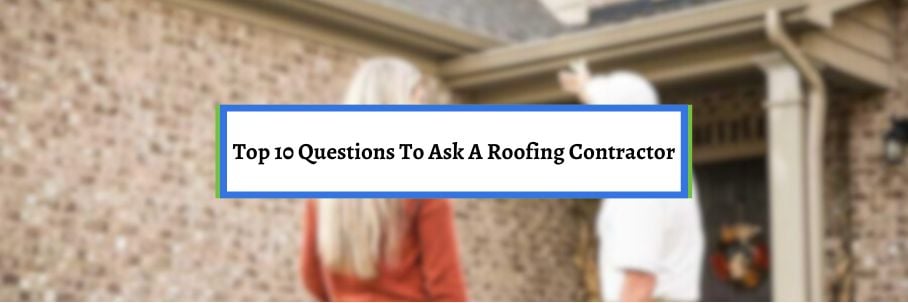
The roofing contractor you hire has the biggest impact on all aspects of your upcoming roof replacement. That’s why choosing the right one is the biggest decision you’ll make as you go through the process.
Unfortunately, this is easier said than done with the number of roofing companies in every area around the country. But you can avoid falling victim to the industry's bad side by simply asking the right questions.
For over 30 years, the team at Bill Ragan Roofing has provided unbiased advice to homeowners so they can find the right roofer for them. That’s why I’ll give you the top 10 questions every homeowner needs to ask a potential roofing contractor.
This article covers the following questions to ask a roofer and why:
- Are you a local roofing contractor?
- Are you licensed, bonded, and insured?
- How long have you been in business in my area?
- What is your workmanship warranty?
- Are you certified by shingle manufacturers?
- Can you give me references for recent projects?
- How do you protect my property during the roof replacement?
- What’s your cleanup process?
- Do you use ice and water shield?
- Will drip edge be installed?
1. Are you a local roofing contractor?
The first question you need to ask is simply if the roofing contractor is local to your area. Regardless of the answer, ask them for their physical office location and ensure their phone number has a local area code.
The main reason to ask this question is to ensure you can find them if your roof ever has a problem, and they know local installation requirements. However, this also helps you avoid out-of-state storm-chasing companies who take advantage of unsuspecting homeowners.
They’ll come in after a big storm, undercut local roofing company prices, get the money, and move on to the next storm-hit town without following local codes or properly installing your roof. This isn’t to say all storm-chasing companies are bad, but it’s not worth the risk, especially with insurance involved.
2. Are you licensed, bonded, and insured?
After asking if they are local, you need to ask the roofing contractor for proof they’re licensed, bonded, and insured in your state specifically. These three pieces of paper protect you and ensure your roofing project is done right.
I recommend asking for physical copies of all three from any potential roofing contractor. If they have them, they’ll have no problem showing proof.
Keep in mind that each state has different requirements, and some areas might not even require one or the other. That’s why you need to research your local codes to ensure the contractor you hire has all the appropriate permits and paperwork for your area.
However, I still recommend looking for a roofing contractor with all three to truly protect you and your roof investment.
3. How long have you been in business in my area?
Next, you need to ask how long the roofing contractor has been in business. This is to ensure you're hiring a company that’s established and has a strong history in your area.
This isn’t to say the longer a roofing company has been in the business makes them better; it just means they'll be around if there's a problem. After all, you’ll spend a lot of money on your roof, so you want to make sure they’ll still be there to take care of your investment five years from now.
Just know that newer roofing companies will most likely have cheaper prices due to lower overhead. This isn’t necessarily bad, but it’s something to be wary of when choosing your roofing contractor.
4. What is your workmanship warranty?
Part of a roofing contractor being established in your area is having a strong workmanship history. That’s why you need to ask what kind of workmanship warranty they offer.
This could be anywhere from 1 year, 2 years, 3 years, 5 years, 10 years, 25 years, or even a lifetime. I recommend not settling for anything less than a 10-year workmanship warranty.
However, a roofing contractor who trusts the quality of their workmanship and products should have no problem providing a lifetime warranty or close to it (20 years). Just know that all roof warranties are only worth the paper they're written on, so you need to look at reviews to ensure they stand behind them.
5. Are you certified by shingle manufacturers?
Next, you need to ask a roofing contractor if they’re certified by any of the major shingle manufacturers. If they’re certified, the shingle manufacturer trusts them to install their products to the right standards.
If a roofing contractor is established in the community and is known for high-quality work, the shingle manufacturers actually seek them out for certification. It carries even more weight when considering they only choose 6-10 contractors in a given area to go through the certification process.
Once certified, a roofing contractor can offer the best material warranties and enhanced warranties from the specific manufacturer.
6. Can you give me references for recent projects?
Next, ask every roofing contractor who gives you an estimate to provide you with references from jobs completed in the past 3 to 6 months. This usually revolves around driving by the homes to see the quality of work.
While I don’t recommend it, you can knock on doors and talk to past clients about their experiences if you’re feeling brave. A reputable roofing contractor will happily provide references when you ask for them.
However, don’t even think about investing in your new roof with them if they’re not willing to let you see previous work.
7. How do you protect my property during the roof replacement?
A roofing contractor should do everything possible to protect your property during your roof replacement. That’s why you need to ask what precautions they take to protect your lawn, landscaping, windows, light fixtures, etc.
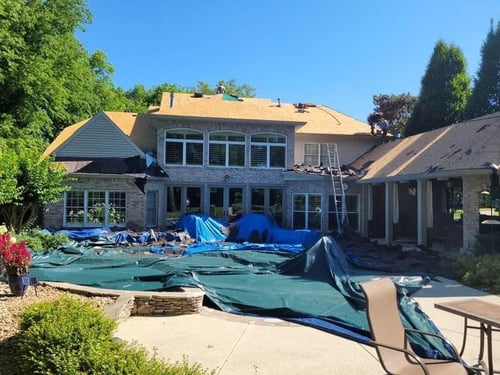
For example, reputable roofing contractors secure a tarp from your gutters down to a “dump” tarp on the ground to cover the landscaping surrounding the base of your home. Unfortunately, some companies include a clause that they’re not liable for damage in the fine print of their roof estimate.
If the roofing contractor does cause damage, all they have to do is show you the clause in the fine print showing they’re not responsible.
8. What’s your cleanup process?
Protecting your property is a crucial piece of the roof replacement process, but so is cleaning up. That’s why you need to ask a roofing contractor how they clean up during and after your roof replacement.
If they do things right, cleaning up happens during the entire project by getting every piece of debris and trash into a dump trailer. Most crews have designated teams whose entire job is to pick up debris and get it to the right place.
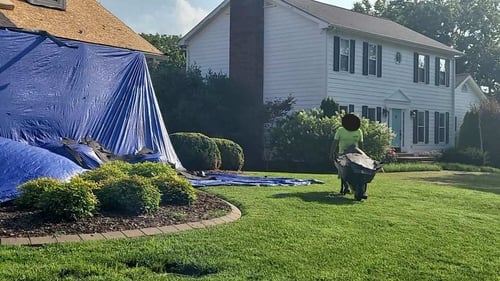
While cleaning up debris throughout is important, making sure there are no leftover nails on the ground or in gutters is crucial after the roof replacement is completed. They should walk around your property with magnets two or three times to catch stragglers.
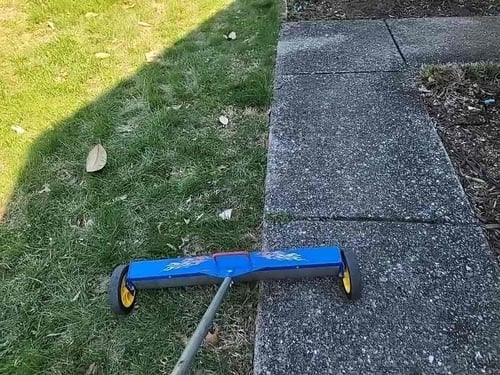
The last thing you want is a punctured tire or, worse, your family stepping on a leftover nail.
9. Do you use ice and water shield?
Ice and water shield is a waterproof membrane used to protect your roof decking if water gets underneath the roofing material. It must be installed on/around certain areas, like roof valleys, around penetrations, and roofs with a 2/12, 3/12, or 4/12 pitch.
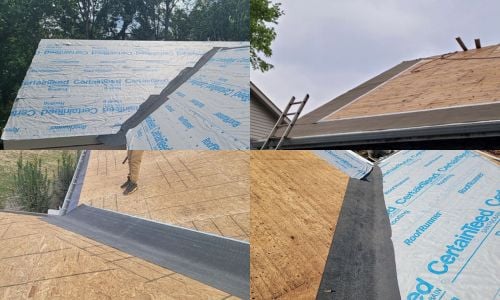
Because of its importance, every roof needs to have it. However, not every roofing contractor uses it to cut down on costs.
That’s why you need to ask every roofing contractor if they use ice and water shield. You should also ask where they install it and why to ensure they’re not just saying “yes” to a general question.
10. Will drip edge be installed?
Just like ice and water shield is a crucial roofing component, so is drip edge. Drip edge is a metal flashing installed on the roof’s edges (rakes and eaves) to prevent water from getting underneath roofing components.
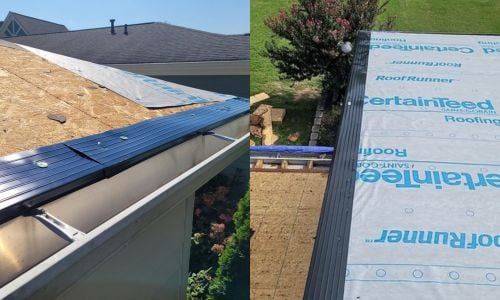
While leak prevention is its purpose, the main reason you must ask a roofing contractor if it’ll be installed is because it’s a literal building code. According to code R905.2.8.5 of the 2018 IRC: “A drip edge shall be provided at eaves and gables of shingle roofs.”
This code clearly states that a drip edge must be installed on the edges of your roof to ensure your home is up to code. But asking every potential roofing contractor if drip edge will be installed is one thing, but you should also ask about the installation.
The rest of code R905.2.8.5 states: “Adjacent pieces of a drip edge shall be overlapped a minimum of 2 inches. A drip edge shall extend a minimum of a ¼ of an inch below roof decking and extend up a minimum of 2 inches. Underlayment must be installed over the drip edge along the eaves and under the underlayment on gables.”
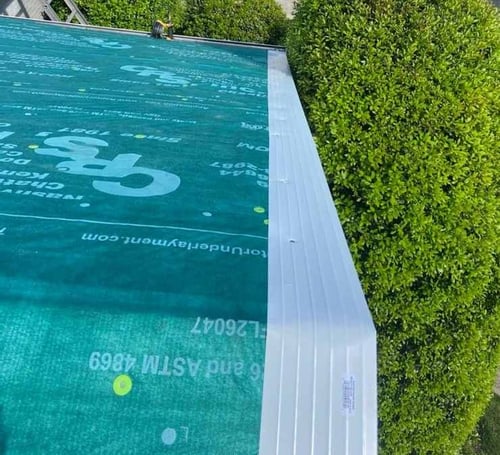
This means even if it’s there, improperly installing drip edge means your home won’t be up to code. Just know if your home has a pre-bent aluminum fascia or rake molding it serves as a drip edge.
What are the signs of a bad roofing contractor?
Now you know the top 10 questions you should ask a roofing contractor. Asking these 10 questions is a great start to finding a roofing contractor for your upcoming roof replacement.
If you want a downloadable version with these questions and more on hand, get The Questions to Ask a Roofing Contractor checklist. But a roofing contractor can say all the right things and still do things differently.
Luckily, you can spot a bad roofing contractor if you know what to look for. That’s why I wrote another article breaking down the signs of a bad roofer.
Check out 8 Signs of a Bad Roofing Contractor to ensure you don’t make the wrong hiring decision.


